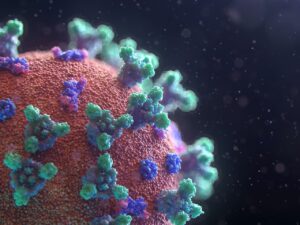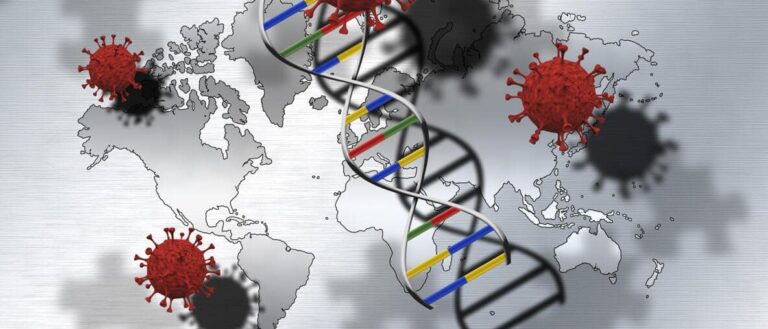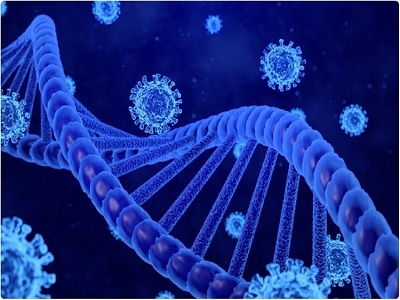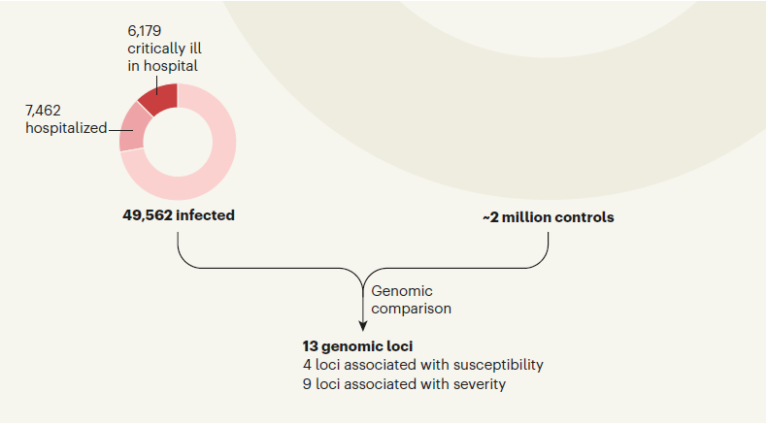Genetics’ effect on the sensitivity & severity of CoVID-19
In general, a person’s genetics has an influence on the risk of infection and the severity of symptoms. A large international study has been identified a part of the human genome, that could increase the severity of CoVID-19.

Why do some people get CoVID-19 more severely?
Some people develop severe pulmonary symptoms if they have CoVID-19, while others do not. It has been more than a year since scientists tried to figure out why. Factors such as age, history of underlying disease, environmental conditions such as economic, social, and community health, play a role in determining the severity of the disease. Human genetic diversity is also likely to affect the type of immune response as well as the severity of symptoms.
The study of the relationship between the human genome and infectious diseases has been less than other diseases for various reasons. The main reason for the lack of studies in this field has been the focus of scientists on the microorganism that causes the infection. In addition, human genetic diversity usually has relatively less effect on the severity of infection than the effects of social and demographic factors such as age or access to health facilities.
Also, identifying the effect of genetic diversity requires a high statistical population. Unlike chronic diseases, the evaluation of the severity and condition of the infectious disease is limited to the short time that the patient is symptomatic. Although genetic diversity has been less studied in this regard, many researchers have studied CoVID-19, and a large international study identified 13 sites that affect immune susceptibility and the severity of coronary heart disease in the human genome.
Do genetic differences affect the severity of CoVID-19 disease?
Previously, scientists had proven the effect of genetic diversity on the severity of infectious diseases. Some of these differences include very effective but rare mutations that are involved in the development of mild symptoms or severe illness. Others are very common types of genetic variations that do not have much effect on the severity of the disease. Initially, these mutations that cause genetic variation are not necessarily dangerous or pathogenic and make a difference between humans. According to scientists, some of these differences cause a strong immune response to CoVID-19 and also increase the severity of the disease in the individual.

What are the findings of recent studies on the role of genetics in the severity of CoVID-19 symptoms?
With the onset of the CoVID-19 epidemic, scientists quickly began a major international collaboration. This large-scale study was conducted in collaboration with about 3,000 researchers using data from 46 studies. More than 49,000 patients with CoVID-19 and 2 million controls from 6 different races and 19 countries participated in the study. To address the challenges, the study’s researchers quickly identified symptomatic patients and removed statistical limitations by establishing international collaborations. In addition, by gathering information about some known risk factors such as age and sex, and including this information in statistical analysis, the role of social and demographic factors was considered.
To compare the results in all 46 study groups, the researchers divided the data into three categories:
- Infection (including disease): Includes people with CoVID-19, with the approval of a doctor, laboratory, or with their own report
- Infection leading to hospitalization: Consists of people with a positive laboratory test and low to severe symptoms.
- Infection leading to severe and critical illness: including patients with a positive laboratory test and severe symptoms who have been hospitalized. These patients needed respiratory support, some of whom died.
To identify the genetic diversity associated with CoVID-19 susceptibility and severity, the researchers first compared differences in the frequency of millions of genetic variants between people infected with the coronavirus and the control population in each study. The results of these 46 studies were then combined.
Using these analyzes, the researchers identified 13 sites in the human genome that were associated with SARS-CoV-2 infection and the severity of the disease. Of these, 6 loci were not reported in previous studies of the human genome and CoVID-19. Also, four gene loci affect general susceptibility to SARS-CoV-2, and no other is associated with disease severity. It is interesting to note that two of the gene loci discovered were identified only when people of East Asian descent participated in the study. This highlights the importance of including diverse populations in human genome studies.
To better understand the mechanisms that link these loci to the severity and effects of covid, the researchers looked for genes adjacent to the 13 loci discovered. These genes are called candidate genes. More than 40 of these candidate genes were identified in this regard. These include several genes that were previously known to affect genes that function in the immune system or lungs.
One example is the TYK2 gene. Some variants of this gene can increase susceptibility to viral, bacterial, and fungal infections. According to a recent study, people with certain mutations in TYK2 are at higher risk for hospitalization or developing a critical illness due to SARS-CoV-2 infection. Another example is the DPP9 gene, which can increase the risk of rare lung disease in some of its variants. A variant of this gene increases the risk of acute types of CoVID-19.
Are the results of this study useful in the treatment and prevention of CoVID-19?
This study is an important milestone in our understanding of the role of human genetics on SARS-CoV-2 susceptibility. However, future experiments should examine all genes, signaling pathways, and biological mechanisms associated with identified gene loci.
As mentioned earlier, there are limitations to large-scale human genome projects. For example, despite researchers’ efforts to include people of diverse races, about 80% of the participants in the study are of European descent. To ensure the comprehensiveness of the results and to identify other loci that are likely to be found in individuals of other races, future studies should include more individuals of diverse races. In addition, another question that arises is about the combination of the effects of different strains of the virus on individuals with genetic differences.
Despite these limitations, the results of this study are important not only for enhancing our understanding of differences in the susceptibility and severity of CoVID-19 disease in different individuals but also for the value of global collaboration to find the role of the human genome in responding to infectious diseases. Emphasizes. Infections are one of the leading causes of death in low-income countries. Infectious diseases are also a growing global threat due to climate change, urbanization, and population growth. Such research in the field of the human genome can be a tool for understanding the biological mechanisms underlying immune responses in different individuals and ultimately the development of new vaccines and drugs.
References:
https://www.nature.com/articles/d41586-021-01773-7
https://www.nature.com/articles/s41586-021-03767-x



